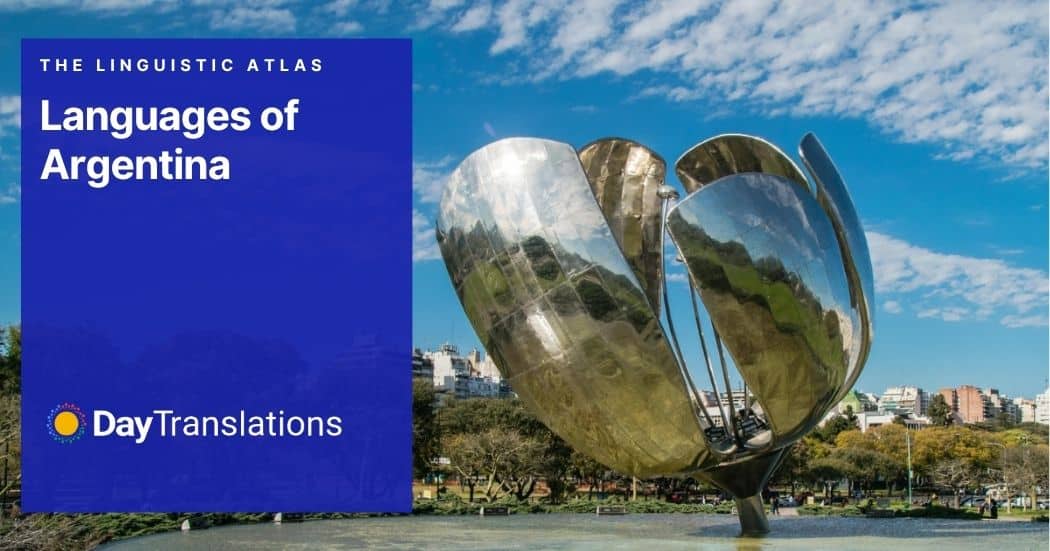With around 46 million native speakers of the Spanish language, Argentina is the fourth-ranked country when it comes to Spanish speakers. Mexico is the global leader of the Spanish-language pack, with more than 120 million people whose mother tongue is Spanish. Still, bear in mind that the languages of Mexico go beyond the local Spanish variation, with numerous indigenous languages and dialects.
However, Spanish is not the official language of Argentina. Those asking themselves “What are the official languages of Argentina?” should know that the official languages of Argentina are non-existent. Spanish is the local lingua franca, but it is not the official language.
In the rest of this guide on the languages of Argentina, you will find out how many languages are spoken in Argentina. Also, we will discuss various influences on the development of the Argentina language community.
Official Language of Argentina
As we pointed out in the intro, there’s no official, law-prescribed answer to the question “What is the official language of Argentina?” In the modern era, the Spanish Constitution hasn’t announced one official language. It’s obvious that Spanish is the main language of everyday communication, and it’s the predominant language of the educational system in Argentina. Also, the public administration uses Spanish.
However, if we look back at the history of the official languages of Argentina, we can see that Spanish was the official language under the Spanish colonial government. For better orientation, that was before Argentina announced its independence in 1816. The Spanish colonial rule, although not the kindest one in the world, didn’t ban the use of indigenous languages, but they were not the official languages of Argentina at that time.
What Are the Top 3 Languages Spoken in Argentina
The most spoken languages in Argentina are Spanish, with a bit more than 46 million speakers (as highlighted above), followed by Italian. Around 1.5 million members of the Argentina language ecosystem have Italian as their first language. The third most spoken language in Argentina is English. Only a handful of 100,000 people are native speakers of English (a handful compared to the 46 million native speakers of Spanish). However, millions of Argentinians use English as a second language, and they use it pretty successfully, especially in Buenos Aires and other urban areas. Since English is not easy to learn, it means that the influence of American pop culture is strong in Argentina. Popular music, TV shows, movies, and streaming platforms have contributed to such an increase in the knowledge of English. Also, younger generations learn English – and other foreign languages – through social media, without too much fuss. In other words, they learn it in a very mindful, very demure way.
The Indigenous Languages Spoken in Argentina
When people ask the question “What languages are spoken in Argentina?”, they often don’t count the indigenous languages.
And yet, the story about the languages of Argentina doesn’t end with the mainstream Argentina language landscape. The entire Latin America used to be inhabited only by indigenous people before the Age of Discovery. Hence, it’s no wonder that some of these languages are still spoken by local people. To be more precise, 39 groups of indigenous people in Argentina speak 14 indigenous languages. Guarani is the most spoken indigenous language of Argentina, with a bit more than 200,000 speakers. When it comes to the Argentina language environment, Guarani is geographically restricted mostly to the northern regions of this country – those that border Paraguay. Interestingly, Guarani is one of the official languages in Paraguay. With more than 10 million speakers altogether in Argentina, Brazil, Paraguay, and Bolivia, Guarani is one of the most prominent languages in South America.
Quechua is the second most spoken indigenous language in Argentina, with around 65,000 speakers. This language is not restricted only to Argentina, but it spreads across Ecuador, Colombia, Chile, Peru, Bolivia, and Brazil. Such languages show us how widespread the local indigenous people were in the times before Spanish colonization.
The third most spoken living indigenous language in Argentina is Mapudungun, with speakers mostly concentrated on the border between Argentina and Bolivia.
Other Languages Spoken in Argentina – Immigrant Stories
Now that we’ve discussed Spanish and other most prominent languages, let’s see what other languages are spoken in Argentina. Italian comes second, mostly thanks to several waves of immigration from Italy to Argentina in the 19th and 20th centuries. Logically, the influence of the Italian language and culture was in Buenos Aires and in the Rio de la Plata area because of the local port and docks for immigrant ships. The Italians also used to settle in Cordoba and Santa Fe.
When it comes to the practical influence of the Italian language, it can be heard in the phonetics and semantics of the local Spanish language in the regions where Italians settled in larger numbers. For instance, Rioplatense Spanish, as the predominant variant of the Spanish language in Argentina and Uruguay, contains a significant number of Italian lexemes. It also contains some intonational similarities with the Italian language.
German was also brought by immigrants from Germany in Europe. This community of German-speaking immigrants wasn’t small at all, especially in the period after World War I and during the 1930s. Today, only a smaller number of people still speak German in Argentina.
The Main Languages of Argentina: The Mutual Influence
The mixture of Spanish and Italian gave birth to the most spoken Spanish dialect in Argentina. The indigenous languages of Argentina have also borrowed various words into the mainstream speech. The influence of the English language on the Argentina language system is seen in everyday communication. From technical and technological terms to social media and viral slang words, English is becoming the most influential non-Spanish language in Argentina.
The further development of languages in Argentina will keep happening at the points of their contact. Therefore, the mutual influence will keep intensifying, contributing to the further diversity of the language landscape in this South American country.
Languages of Argentina: Day Translations Can Help
Day Translations delivers expert translation services, on-demand interpreting, and culturally precise localization services tailored to the diverse linguistic landscape of Argentina. Partner with us to communicate clearly and respectfully across regions and industries. Get a free quote now!











Sorry, the comment form is closed at this time.